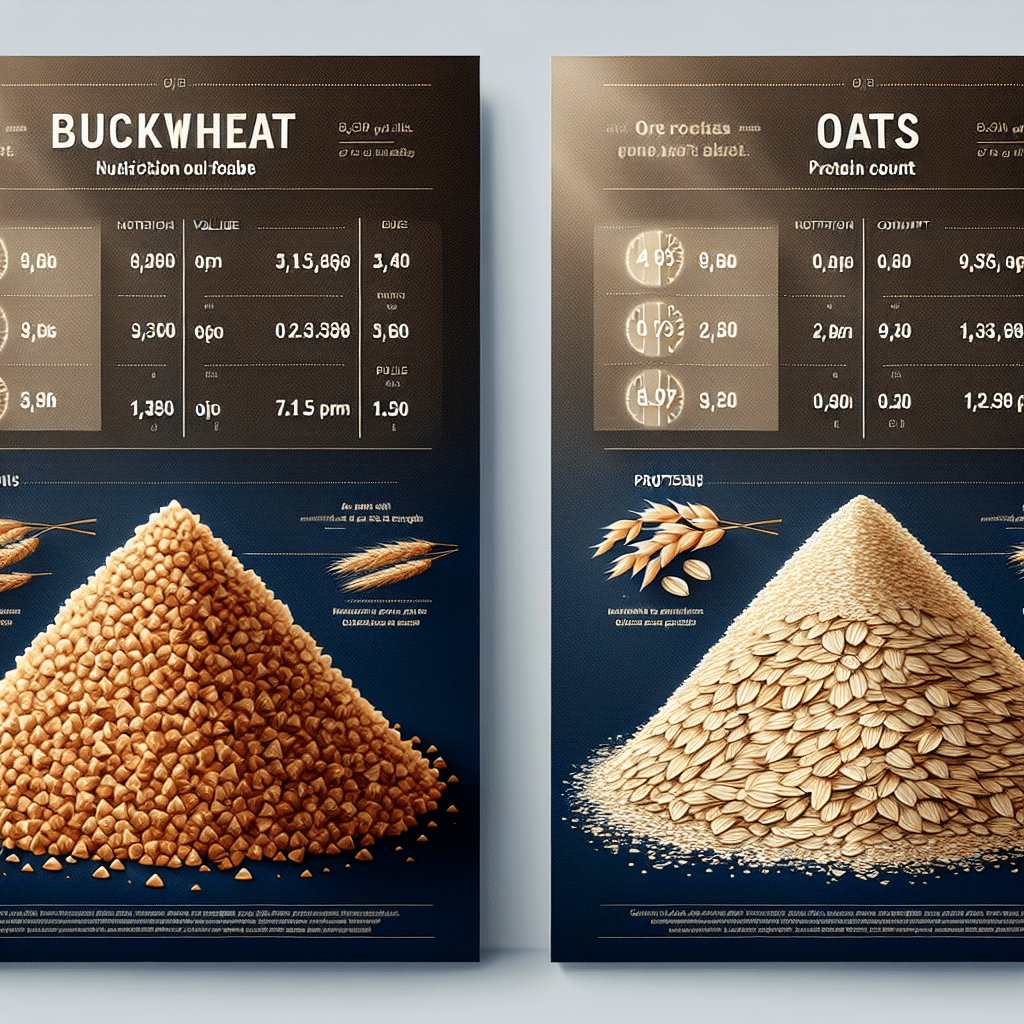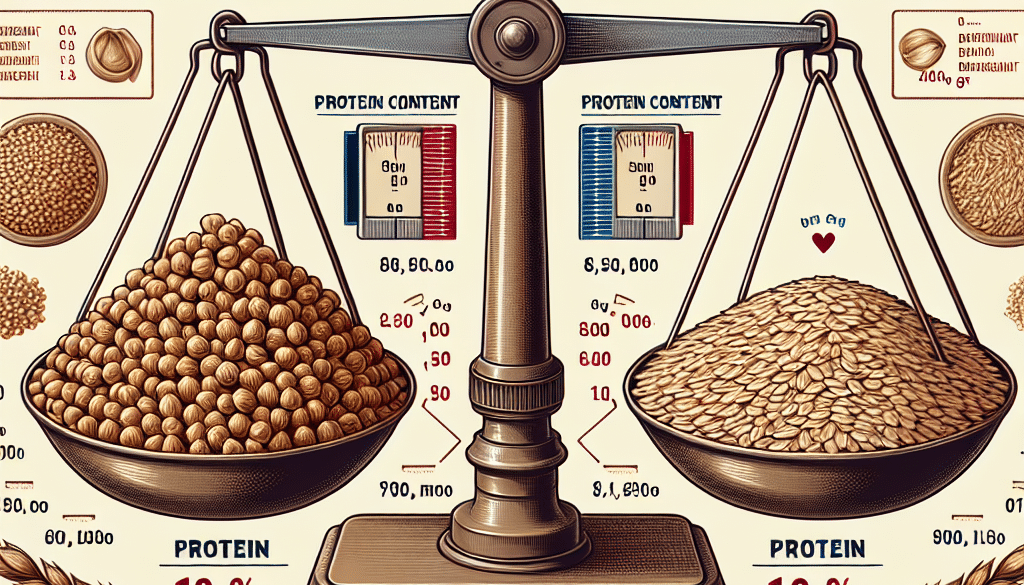What Has More Protein Buckwheat Or Oats?
-
Table of Contents
- Buckwheat vs. Oats: Which Has More Protein?
- Understanding Protein in Grains
- Nutritional Profile of Buckwheat
- Nutritional Profile of Oats
- Comparing Buckwheat and Oats
- Protein Quality
- Dietary Fiber
- Mineral Content
- Health Benefits of Buckwheat and Oats
- Incorporating Buckwheat and Oats into Your Diet
- Conclusion: The Protein Winner
- Discover ETprotein’s High-Quality Protein Products
Buckwheat vs. Oats: Which Has More Protein?

When it comes to choosing healthy grains, buckwheat and oats often come up as nutritious options packed with protein. But which one of these superfoods offers more protein? This article delves into the nutritional profiles of buckwheat and oats, comparing their protein content and discussing the benefits of each. We’ll also look at how these grains fit into a balanced diet and how they can contribute to your health and wellness goals.
Understanding Protein in Grains
Protein is a crucial macronutrient necessary for building and repairing tissues, making enzymes and hormones, and supporting overall health. Grains are often overlooked as a source of protein, but many, including buckwheat and oats, contain significant amounts.
Nutritional Profile of Buckwheat
Buckwheat, despite its name, is not related to wheat and is actually a gluten-free pseudocereal. It’s known for its high-quality protein content, which includes all nine essential amino acids, making it a complete protein source. Buckwheat is also rich in minerals like magnesium, phosphorus, and iron.
- Protein content: Approximately 13 grams per 100 grams of raw buckwheat
- Other nutrients: High in fiber, antioxidants, and bioflavonoids such as rutin
Nutritional Profile of Oats
Oats are a whole grain that has long been praised for their health benefits, including lowering cholesterol levels and reducing the risk of heart disease. They are also a good source of protein and fiber.
- Protein content: Roughly 10 grams per 100 grams of raw oats
- Other nutrients: Rich in beta-glucan, a type of soluble fiber, and contain various vitamins and minerals
Comparing Buckwheat and Oats
When directly comparing the protein content of buckwheat and oats, buckwheat comes out slightly ahead. However, both grains offer a substantial amount of this macronutrient and can be valuable parts of a protein-rich diet.
Protein Quality
While buckwheat has a higher protein content, the quality of protein in both grains is worth noting. Buckwheat’s complete protein profile is particularly beneficial for vegetarians and vegans who may struggle to get all essential amino acids from plant-based sources.
Dietary Fiber
Both grains are excellent sources of dietary fiber, which is important for digestive health. Oats have a higher soluble fiber content, which is beneficial for heart health, while buckwheat contains more insoluble fiber, which aids in digestion.
Mineral Content
Buckwheat is richer in certain minerals such as magnesium and iron compared to oats. These minerals are vital for various bodily functions, including oxygen transport and energy production.
Health Benefits of Buckwheat and Oats
Both buckwheat and oats offer a range of health benefits beyond their protein content. Here are some of the advantages of incorporating these grains into your diet:
- Heart Health: The fiber in oats can help lower cholesterol levels, while the rutin in buckwheat can strengthen blood vessels.
- Weight Management: The high fiber content in both grains can help you feel full longer, aiding in weight control.
- Blood Sugar Control: Both grains have a low glycemic index, which can help manage blood sugar levels, especially beneficial for those with diabetes.
- Gluten-Free Options: For those with celiac disease or gluten sensitivity, buckwheat is a naturally gluten-free alternative.
Incorporating Buckwheat and Oats into Your Diet
Both buckwheat and oats are versatile grains that can be used in a variety of dishes. Here are some ideas for including them in your meals:
- Buckwheat: Use buckwheat flour for pancakes or noodles, or add cooked buckwheat groats to salads and soups.
- Oats: Enjoy a bowl of oatmeal for breakfast, bake oats into cookies and bars, or use them as a topping for yogurt and fruit.
Conclusion: The Protein Winner
In the battle of protein content between buckwheat and oats, buckwheat emerges as the winner with a slightly higher protein count and a complete amino acid profile. However, both grains are nutritious choices that offer a variety of health benefits. Depending on your dietary needs and preferences, you may choose to include one or both in your diet to reap their nutritional rewards.
Discover ETprotein’s High-Quality Protein Products
If you’re looking to supplement your diet with additional protein, consider ETprotein’s range of organic bulk vegan proteins. Their products, including rice protein, pea protein, and various seed proteins, are non-GMO, allergen-free, and feature a neutral taste. ETprotein caters to a wide array of industries and can help you meet your protein needs with their high-purity offerings.
About ETprotein:
ETprotein, a reputable protein and L-(+)-Ergothioneine (EGT) Chinese factory manufacturer and supplier, is renowned for producing, stocking, exporting, and delivering the highest quality organic bulk vegan proteins and L-(+)-Ergothioneine. They include Organic rice protein, clear rice protein, pea protein, clear pea protein, watermelon seed protein, pumpkin seed protein, sunflower seed protein, mung bean protein, peanut protein, and L-(+)-Ergothioneine EGT Pharmaceutical grade, L-(+)-Ergothioneine EGT food grade, L-(+)-Ergothioneine EGT cosmetic grade, L-(+)-Ergothioneine EGT reference grade and L-(+)-Ergothioneine EGT standard. Their offerings, characterized by a neutral taste, non-GMO, allergen-free attributes, with L-(+)-Ergothioneine purity over 98%, 99%, cater to a diverse range of industries. They serve nutraceutical, pharmaceutical, cosmeceutical, veterinary, as well as food and beverage finished product distributors, traders, and manufacturers across Europe, USA, Canada, Australia, Thailand, Japan, Korea, Brazil, and Chile, among others.
ETprotein specialization includes exporting and delivering tailor-made protein powder and finished nutritional supplements. Their extensive product range covers sectors like Food and Beverage, Sports Nutrition, Weight Management, Dietary Supplements, Health and Wellness Products, and Infant Formula, ensuring comprehensive solutions to meet all your protein needs.
As a trusted company by leading global food and beverage brands and Fortune 500 companies, ETprotein reinforces China’s reputation in the global arena. For more information or to sample their products, please contact them and email sales(at)ETprotein.com today.














